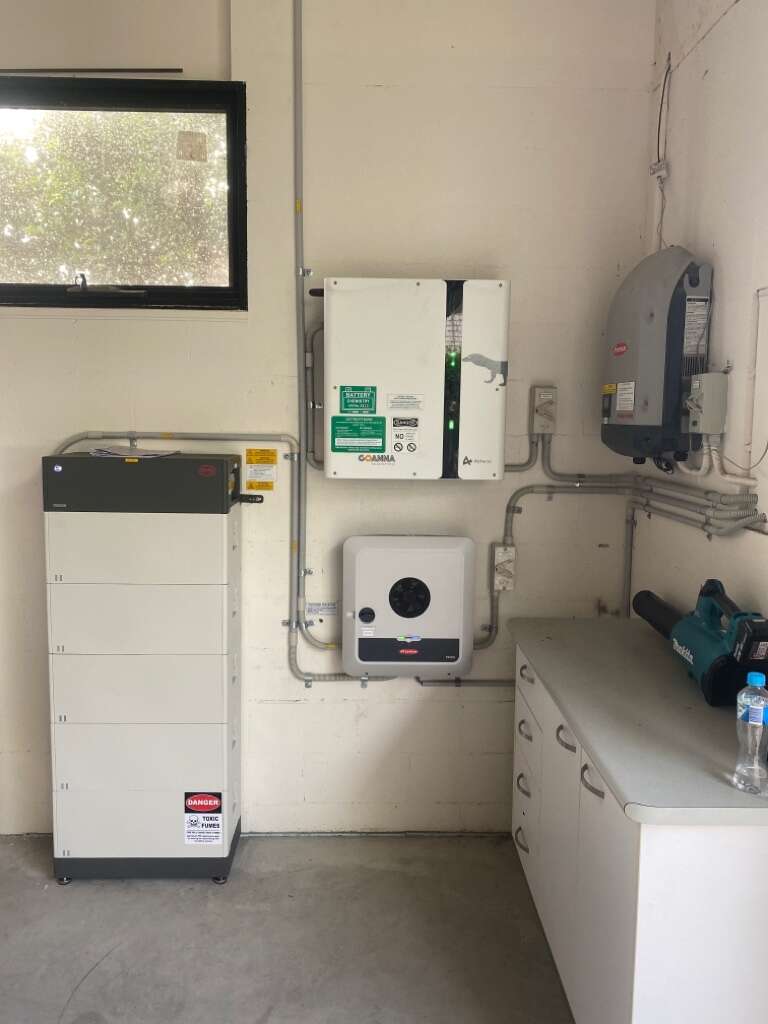
Many people are buying a battery for their home or business, so beware of cheap and unreliable products.
Battery and Inverter combinations that seem too cheap – simply are, they may not work effectively, rapidly degrade their battery capacity, give no blackout protection, cause a fire, and or cease being supported in Australia before they reach their claimed lifespan.
A high-quality Solar and battery hybrid system will pay for itself within the warranty period but only just, and that’s with the Solar panels doing most of the financial ‘heavy lifting’. So if you’re doing your homework then you’ll probably want a few more reasons to make it worthwhile.
Blackout protection is the most common secondary feature, with fires, storms and floods increasingly causing concerns to home or small business owners, but a lot of products may be too weak to run a realistic number of appliances when the grid goes down, so please do some online research and have an accredited designer go through their design process with you when they come to site, and never purchase only over the internet or phone.
Some companies and energy retailers are spruiking the idea of being part of a Virtual Power Plant program, but they may have variable pricing and daily caps of kWhrs that are allowed to be exported. Remember that you are cycling your battery which is draining your assets value at around 20c per round trip ‘cycle’ so these financial contracts usually don’t stack up. The Australian market operator is talking about changing the rules on the National Electricity Market to allow for more value to flow back to your retailer for dispatchable energy, so this may increase the benefits and competition in coming years.
The aspects that we consider if we are recommending a battery include:
- Is the inverter and battery capable of running all of the appliances that we expect to be running during a blackout?
- Does the system automatically drop out ‘non-essential’ circuits when the grid blacks out? This makes the battery last effectively.
- Does the inverter have an ability to set a ‘reserve’ battery level for blackouts? Meaning that even after a cloudy day the battery will have a certain percentage left over. Also consider this when sizing the battery.
- Does the building have single, dual or three phase power connections, and are there any plans for new high-power appliances? Consider the future of fast charging for electric vehicles.
- Will the inverter continue to produce Solar energy during a blackout?
- Most Solar & Battery hybrid systems run at around a 80-85% cycle efficiency, a world award for the best efficiency rating was 92.2% and this was achieved with a Fronius & BYD combination.
There are plenty of battery specifications to consider:
- The manufacturers length of time in Australia, their warranty, and record of after sales support
- The price – per kilowatt hour, per cycle life, including the degradation over lifespan.
- Has there been any Independent testing of the battery’s speed of degradation?
- Temperature effects – both the upper and lower limits
- Maximum power input and output ratings – in relation to the above temperature limits
- Weight / Size / Shape
- Components that can wear out or fail – such as a pumps on flow batteries
- Battery location limitations – where you can store it: Standard AS/NZS 5139:2019
- Water resistance of the enclosure: the IP rating
- Recyclability and toxicity of the materials
- Conflict Minerals used in the battery cells manufacture (Cobalt being the most concerning)
- Ability to expand the battery capacity with more cells
- Fire safety – the ability for a battery cells chemistry to sustain a flame.
Lithium Nickel Manganese Cobalt (LNMC) is a type of serious concern, therefore we recommend and sell Lithium Iron Phosphate (LiFePO4) cells – they last a little longer and are therefore relatively the same price per cycle. Have to look at the 2021 Victorian big battery fire as a prime example, it could not be extinguished for 3 days as the LNMC cells produce their own oxygen – we never want to be responsible for a situation like that.
To ensure that your Solar & Battery consultant (not the company) has a design accreditation with the Clean Energy Council then check by surname or location @ CECfindaninstaller
Geoff Tosio – Better Volt Solar + Batteries: Dorrigo
0422 544 555